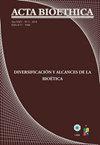卫生公平与司法:从罗尔斯的视角看巴西的统一卫生制度
IF 0.3
4区 哲学
引用次数: 0
摘要
本研究从公共卫生生物伦理学的角度解决了卫生公平和正义问题,描述了巴西统一卫生系统(SUS),将健康等基本商品的合法利益等同起来。约翰·罗尔斯的本文章由计算机程序翻译,如有差异,请以英文原文为准。
Equity in health and justice: a look at the Brazilian unified health system (SUS) from the perspective of John Rawls
This study addresses the issue of equity in health and justice from the perspective of public health bioethics, describing the Brazilian Unified Health System (SUS), equating legitimate interests for essential goods, such as health. The conception of John Rawlsâ theory of justice is âjustice as fairnessâ and has a seventeenth century contractualism tenor. Although it was not conceived specifically for health and marked by the âdifference principleâ, it promoted, in the field of health care, the institution of health systems created on the basis of universal access and equity in the distribution of scarce resources. The principles of the Brazilian Unified Health System (SUS) guarantee access to all levels of care, equality in health care, without distinctions or privileges of any kind, integrity in health care, free of charge, community participation and decentralization, regionalization and hierarchization of health actions and services, which gives the SUS a strong Rawlsian bias. The Brazilian model was built on the principle that health is a right of all and a duty of the State, therefore, it is based on the assumption of universal and equal access to health actions and services for its promotion and recovery.
求助全文
通过发布文献求助,成功后即可免费获取论文全文。
去求助
来源期刊

Acta Bioethica
医学-卫生政策
CiteScore
0.60
自引率
0.00%
发文量
22
审稿时长
1 months
期刊介绍:
Acta Bioethica is a biannual publication by the Interdisciplinary Center for Studies in Bioethics of the University of Chile (ISSN 0717-5906, press edition, y 1726-569-X, electronic edition), which publishes in three languages: Spanish, English and Portuguese.
Indexed in Science Citation Index (SCI), Scopus, Lilacs, SciELO y Latindex, and in database from several Institutions; it constitutes a pluralistic source of perspectives and an important tribune which accepts the contributions of authors compromised with the interdisciplinary study of ethical determinants and consequences of techno scientific research.
 求助内容:
求助内容: 应助结果提醒方式:
应助结果提醒方式:


